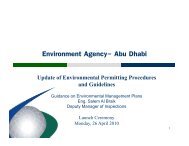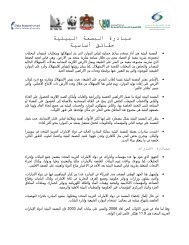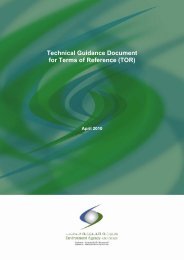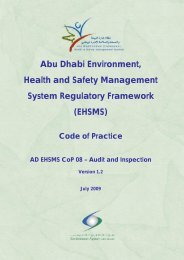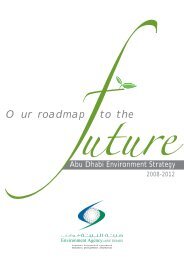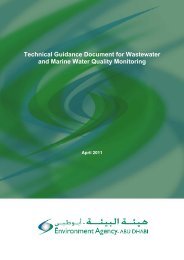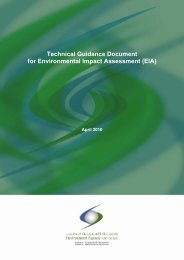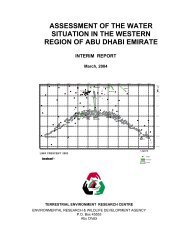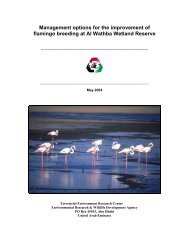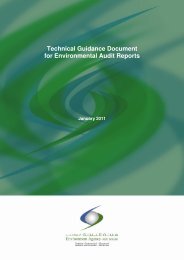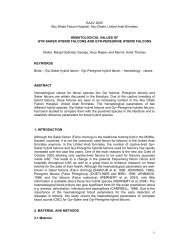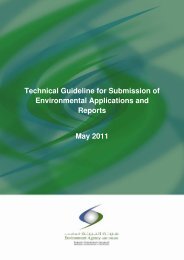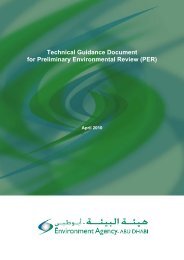Abu Dhabi Declaration on Environment and Energy
Abu Dhabi Declaration on Environment and Energy
Abu Dhabi Declaration on Environment and Energy
- No tags were found...
You also want an ePaper? Increase the reach of your titles
YUMPU automatically turns print PDFs into web optimized ePapers that Google loves.
<str<strong>on</strong>g>Abu</str<strong>on</strong>g> <str<strong>on</strong>g>Dhabi</str<strong>on</strong>g> <str<strong>on</strong>g>Declarati<strong>on</strong></str<strong>on</strong>g> <strong>on</strong>Envir<strong>on</strong>ment<strong>and</strong> <strong>Energy</strong>Date: February 3 rd , 2003The Envir<strong>on</strong>ment & <strong>Energy</strong> 2003 C<strong>on</strong>ference 584
“<str<strong>on</strong>g>Abu</str<strong>on</strong>g> <str<strong>on</strong>g>Dhabi</str<strong>on</strong>g> <str<strong>on</strong>g>Declarati<strong>on</strong></str<strong>on</strong>g> <strong>on</strong> Envir<strong>on</strong>ment <strong>and</strong> <strong>Energy</strong>”The Arab Ministers resp<strong>on</strong>sible for envir<strong>on</strong>ment <strong>and</strong> for energy affairs, meeting in <str<strong>on</strong>g>Abu</str<strong>on</strong>g> <str<strong>on</strong>g>Dhabi</str<strong>on</strong>g> withinthe framework of the Envir<strong>on</strong>ment <strong>and</strong> <strong>Energy</strong> Exhibiti<strong>on</strong> <strong>and</strong> C<strong>on</strong>ference 2003:Reaffirming the importance of <str<strong>on</strong>g>Abu</str<strong>on</strong>g> <str<strong>on</strong>g>Dhabi</str<strong>on</strong>g> <str<strong>on</strong>g>Declarati<strong>on</strong></str<strong>on</strong>g> <strong>on</strong> the future of the Arab Envir<strong>on</strong>mental Acti<strong>on</strong>2001, the Arab <str<strong>on</strong>g>Declarati<strong>on</strong></str<strong>on</strong>g> <strong>on</strong> Sustainable Development 202, the Sustainable Development Initiative inthe Arab Regi<strong>on</strong> 2002, <strong>and</strong> the importance of crystallising the Arab priorities included in thesedeclarati<strong>on</strong>s into achievable programmes <strong>and</strong> projects under the umbrella of the Arab League, in coordinati<strong>on</strong>with the relevant regi<strong>on</strong>al <strong>and</strong> internati<strong>on</strong>al bodies <strong>and</strong> organisati<strong>on</strong>s;Noting the results of the 7 th Arab <strong>Energy</strong> C<strong>on</strong>ference 2002, the 7 th Syrian <strong>Energy</strong> C<strong>on</strong>ference 2002, thedecisi<strong>on</strong>s of the Amman Internati<strong>on</strong>al Forum <strong>on</strong> Sustainable Envir<strong>on</strong>ment <strong>and</strong> Development 2001, theJeddah <str<strong>on</strong>g>Declarati<strong>on</strong></str<strong>on</strong>g> <strong>on</strong> Development from an Islamic Perspective, the Islamic <str<strong>on</strong>g>Declarati<strong>on</strong></str<strong>on</strong>g> <strong>on</strong>Sustainable Development issues, adopted by the 1 st Islamic C<strong>on</strong>ference 2002 in Jeddah, the decisi<strong>on</strong>sof the UN C<strong>on</strong>ference <strong>on</strong> Envir<strong>on</strong>ment <strong>and</strong> Development in Brazil in 1992, the Agenda 21 <strong>and</strong> the Rio<str<strong>on</strong>g>Declarati<strong>on</strong></str<strong>on</strong>g> <strong>and</strong> the decisi<strong>on</strong>s of the World Summit <strong>on</strong> Sustainable Development in Johannesburg2002, which called up<strong>on</strong> governments, regi<strong>on</strong>al <strong>and</strong> internati<strong>on</strong>al organisati<strong>on</strong>s <strong>and</strong> other interestparties to apply the recommendati<strong>on</strong>s <strong>and</strong> results of the Sustainable Development Committee regardingc<strong>on</strong>tributi<strong>on</strong> of energy in achieving sustainable development;Following with anxiety the growing atomic programmes of some countries in the regi<strong>on</strong> which do notallow the Internati<strong>on</strong>al Atomic <strong>Energy</strong> Agency, IAEA, to m<strong>on</strong>itor their activities in the military <strong>and</strong>peaceful fields related to hydro-power generati<strong>on</strong>, these resulting in radio-active impacts harmful to theregi<strong>on</strong>’s populati<strong>on</strong>, <strong>and</strong> the wildlife <strong>and</strong> marine life due to leakage of radio-active material into groundwater <strong>and</strong> the other possible trans-border effects that might affect coming generati<strong>on</strong>s, <strong>and</strong> also thenegative impacts arising out of the use of atomic energy for power generati<strong>on</strong>;Noting the recommendati<strong>on</strong>s in the Arab statement <strong>on</strong> envir<strong>on</strong>ment presented to the World Summit <strong>on</strong>Sustainable Development in Johannesburg 2002;Calling up<strong>on</strong> the industrialised countries to fulfil their obligati<strong>on</strong>s towards developing countries tosupport <strong>and</strong> facilitate transfer of envir<strong>on</strong>mentally safe <strong>and</strong> sound technology for energy producti<strong>on</strong>,according to internati<strong>on</strong>al treaties;Taking into account the UN Framework C<strong>on</strong>venti<strong>on</strong> <strong>on</strong> Climate Change (UNFCCC) <strong>and</strong> the KyotoProtocol (KP), the results of the 8 th C<strong>on</strong>ference of the Parties (COP8) <strong>on</strong> the Framework Treaty <strong>on</strong>Climate Change 2002 <strong>and</strong> the New Delhi Ministerial <str<strong>on</strong>g>Declarati<strong>on</strong></str<strong>on</strong>g> <strong>on</strong> Climate Change <strong>and</strong> SustainableDevelopment which reaffirmed the importance of formulating the policies <strong>and</strong> procedures suitable forthe c<strong>on</strong>diti<strong>on</strong>s of each party of the agreement for the protecti<strong>on</strong> of climate system;Recognising the fact that the Arab world has made a number of achievements in different <strong>and</strong> complexhealth, educati<strong>on</strong>, ec<strong>on</strong>omic, social <strong>and</strong> envir<strong>on</strong>mental fields over recent years, <strong>and</strong> also recognising theproblems resulting from urbanisati<strong>on</strong> <strong>and</strong> increases in populati<strong>on</strong> <strong>and</strong> the associated growth in terms ofdem<strong>and</strong> for <strong>and</strong> use of energy for ec<strong>on</strong>omic <strong>and</strong> social development, this making energy a fundamentalelement of development in order to achieve more growth <strong>and</strong> progress in Arab communities;Aware of the existing challenges <strong>and</strong> opportunities <strong>and</strong> the c<strong>on</strong>tributi<strong>on</strong> of the energy sector inachieving sustainable development in the Arab world, <strong>and</strong> the importance of oil <strong>and</strong> gas as a strategicwealth, as well as of the potential offered by renewable energy resources in the Arab world whichcould be utilised;Noting that there is still scientific uncertainty related to the phenomen<strong>on</strong> of climate change <strong>and</strong> itsresults, <strong>and</strong> that there is no scientific c<strong>on</strong>firmati<strong>on</strong> that this phenomen<strong>on</strong> is primarily a result ofemissi<strong>on</strong>s resulting from the c<strong>on</strong>sumpti<strong>on</strong> of hydrocarb<strong>on</strong>, <strong>and</strong> further noting that such unfoundedallegati<strong>on</strong>s <strong>and</strong> doubts would make victims of the oil <strong>and</strong> gas sector <strong>and</strong> may result in a recessi<strong>on</strong> inworld dem<strong>and</strong>, thus harming the interests of producers;Following, with anxiety the growing trends to enforce biased limitati<strong>on</strong>s <strong>on</strong> oil usage <strong>on</strong> the pretext ofenvir<strong>on</strong>mental protecti<strong>on</strong>, such trends having the capacity to have a negative effect up<strong>on</strong> revenuesThe Envir<strong>on</strong>ment & <strong>Energy</strong> 2003 C<strong>on</strong>ference 585
arising from oil exports by the producing countries <strong>and</strong>, therefore, affecting adversely local <strong>and</strong> relatedregi<strong>on</strong>aldevelopment opportunities;Reaffirming the importance of using renewable energy resources <strong>and</strong> adopting envir<strong>on</strong>mentally soundtechnologies including the use of advanced <strong>and</strong> cleaner fossil fuel technologies, the sustainable use ofc<strong>on</strong>venti<strong>on</strong>al energy resources which would meet the increasing need of l<strong>on</strong>g range energy supplies toachieve sustainable development without obstructing opportunities for development at the regi<strong>on</strong>allevel for oil-producing countries;Reaffirming the commitment of the Arab oil-producing countries to make available energy resources toall countries, <strong>and</strong> stressing that their oil revenues still c<strong>on</strong>tribute to ec<strong>on</strong>omic development <strong>and</strong>envir<strong>on</strong>mental protecti<strong>on</strong> in both industrial <strong>and</strong> developing countries worldwide, <strong>and</strong> further noting thatthey promote internati<strong>on</strong>al co-operati<strong>on</strong> by providing assistance in the form of loans <strong>and</strong> grants fordevelopment projects <strong>and</strong> alleviati<strong>on</strong> of poverty in other countries;Reaffirming the necessity of promoting financial <strong>and</strong> political support to achieve the required balancefor development of renewable energies <strong>on</strong> <strong>on</strong>e h<strong>and</strong> <strong>and</strong> c<strong>on</strong>venti<strong>on</strong>al energy <strong>on</strong> the other h<strong>and</strong>,encouraging the adopti<strong>on</strong> of cleaner fossil energy technologies to c<strong>on</strong>tribute in supporting sustainabledevelopment <strong>and</strong> avoiding any negative impact <strong>on</strong> the ec<strong>on</strong>omies of the countries whose incomedepend <strong>on</strong> oil <strong>and</strong> gas;Reaffirming that the ultimate priority of the Arab countries will c<strong>on</strong>centrate <strong>on</strong> the alleviati<strong>on</strong> ofpoverty <strong>and</strong> the achieving of sustainable development in their countries;Aware of the significant progress achieved in universities <strong>and</strong> academic <strong>and</strong> research instituti<strong>on</strong>s in theArab countries in the field of qualified pers<strong>on</strong>nel <strong>and</strong> state-of-the-art equipment, in additi<strong>on</strong> to thepotential available in the specialised applied instituti<strong>on</strong>s established within the energy sector <strong>and</strong> theprogrammes which are linked to the requirements of Arab society which have the capacity to c<strong>on</strong>tributein a significant way to the development of c<strong>on</strong>venti<strong>on</strong>al <strong>and</strong> renewable energy technologies that canserve the sustainable interests of the Arab countries;Realising the major development made in terms of the efficiency of the envir<strong>on</strong>ment instituti<strong>on</strong>s in theArab world, <strong>and</strong> the increase in the numbers of their trained staff, the issuance of envir<strong>on</strong>mentallegislati<strong>on</strong>s, envir<strong>on</strong>mental st<strong>and</strong>ards <strong>and</strong> specificati<strong>on</strong>s for reducing polluti<strong>on</strong>, the strategies <strong>and</strong> acti<strong>on</strong>plans for preservati<strong>on</strong> <strong>and</strong> sustainable utilisati<strong>on</strong> of natural resources, the attenti<strong>on</strong> paid to combatdesertificati<strong>on</strong> <strong>and</strong> the preservati<strong>on</strong> of biodiversity, marine life, <strong>and</strong> water sources <strong>and</strong> quality, as wellas to air quality, the quality of air, management of chemicals, hazardous waste <strong>and</strong> drainage, <strong>and</strong>promoti<strong>on</strong> of clean producti<strong>on</strong> methods, in additi<strong>on</strong> to the increasing number of nature reserves, thesignature of regi<strong>on</strong>al <strong>and</strong> internati<strong>on</strong>al treaties <strong>and</strong> the growing role of civil society in protecting theenvir<strong>on</strong>ment;Applauding the growing interacti<strong>on</strong> of energy <strong>and</strong> envir<strong>on</strong>ment instituti<strong>on</strong>s in creating the necessaryenvir<strong>on</strong>mental c<strong>on</strong>diti<strong>on</strong>s <strong>and</strong> specificati<strong>on</strong>s to guarantee achievement of sustainable development inthe Arab world;Reaffirming the necessity of encouraging the integrati<strong>on</strong> of Arab available energy markets, <strong>and</strong> theintensificati<strong>on</strong> of investment related to development of the infrastructure for available energy sourcesin the Arab world;Call for the following:- Reaffirmati<strong>on</strong> of the right of the Arab countries to undertake the sustainabledevelopment of their natural resources, particularly those countries which dependmainly <strong>on</strong> revenues from the producti<strong>on</strong>, processing <strong>and</strong> exporting of oil <strong>and</strong> gas, aswell as in the preservati<strong>on</strong> of those resources to achieve sustainable development inthe Arab world;- Reaffirmati<strong>on</strong> of the necessity of a c<strong>on</strong>tinuous <strong>and</strong> unobstructed supply of oil <strong>and</strong> gasto internati<strong>on</strong>al markets to ensure a c<strong>on</strong>tinuity of sustainable development;The Envir<strong>on</strong>ment & <strong>Energy</strong> 2003 C<strong>on</strong>ference 586
- Urging industrialised countries to adopt policies leading to reducti<strong>on</strong> of differences inenergy markets, in particular policies to avoid any discriminatory treatment byc<strong>on</strong>sumer countries <strong>on</strong> oil <strong>and</strong> gas, through the impositi<strong>on</strong> of taxati<strong>on</strong> or theintroducti<strong>on</strong> of any unfair support for other sources <strong>and</strong> types of energy, which wouldlead to a reducti<strong>on</strong> in dem<strong>and</strong> for oil <strong>and</strong> gas <strong>and</strong> harm the revenues of producingcountries <strong>and</strong> their development;- Assistance to Arab countries to mobilise adequate resources to adapt themselves tothe harmful effects of climate change <strong>and</strong> harsh weather c<strong>on</strong>diti<strong>on</strong>s, the rise of sealevel <strong>and</strong> weather fluctuati<strong>on</strong>s, <strong>and</strong> assisting them to formulate nati<strong>on</strong>al strategies todeal with climate change, <strong>and</strong> programmes to reduce the harmful effects of climatechange in accordance with the UNFCCC.- C<strong>on</strong>tinuati<strong>on</strong> <strong>and</strong> promoti<strong>on</strong> of efforts to reform the n<strong>on</strong>-sustainable producti<strong>on</strong> ofenergy <strong>and</strong> c<strong>on</strong>sumpti<strong>on</strong> norms, through the encouragement of technologicaldevelopment <strong>and</strong> a rati<strong>on</strong>ing of energy c<strong>on</strong>sumpti<strong>on</strong> <strong>and</strong> an increasing of theefficiency of energy use in a variety of different ec<strong>on</strong>omic <strong>and</strong> service sectors, aswell as promoti<strong>on</strong> of human skills <strong>and</strong> the technical capacity of the energy sector inrelated fields;- Stimulati<strong>on</strong> of efforts by scientific research institutes, so as to accelerate thedevelopment of cleaner producti<strong>on</strong> technologies for fossil energy in the Arab regi<strong>on</strong><strong>and</strong> worldwide, <strong>and</strong> the development of technologies to reduce emissi<strong>on</strong>s related toenergy use, the cessati<strong>on</strong> of gas flaring associated with the producti<strong>on</strong> <strong>and</strong>manufacturing of crude oil, the giving of maximum strategic priority to thedevelopment of technologies to dispose of carb<strong>on</strong> dioxide gas, <strong>and</strong> taking theinitiative by the delineati<strong>on</strong> of a strategy for the development of technologiesappropriate for cleaner fossil energy producti<strong>on</strong>, including the following:• Supporting Arab <strong>and</strong> world scientific research centres.• Establishment of regi<strong>on</strong>al <strong>and</strong> world partnerships.• Guaranteeing mechanisms to provide adequate funds.• Co-ordinati<strong>on</strong> between scientific centres- Encouragement of cleaner energy related initiatives such as those related to the use ofadvanced technologies in oil <strong>and</strong> natural gas producti<strong>on</strong>, which have been reaffirmedby internati<strong>on</strong>al c<strong>on</strong>ferences such as the Johannesburg Summit for SustainableDevelopment, <strong>and</strong> the multi-party envir<strong>on</strong>mental treaties <strong>and</strong> the Doha meeting ofWorld Trade Organisati<strong>on</strong>, WTO.- Encouragement of the development of universities <strong>and</strong> academic research institutesin the Arab world, as well as co-ordinati<strong>on</strong>, through support both from the Arabworld <strong>and</strong> globally, in the undertaking by them of research <strong>on</strong> c<strong>on</strong>venti<strong>on</strong>al, new <strong>and</strong>renewable energy, as well as related practical applicati<strong>on</strong>s, particularly in the field ofsea water desalinati<strong>on</strong>, together with the establishment of links between theseinstituti<strong>on</strong>s <strong>and</strong> appropriate instituti<strong>on</strong>s of renown throughout the world;- Encouragement for the producti<strong>on</strong> <strong>and</strong> general use of lead-free fuels which c<strong>on</strong>tainsless sulphur, thereby reducing risks to human health <strong>and</strong> the envir<strong>on</strong>ment, <strong>and</strong> for thepromoti<strong>on</strong> of the use of natural gas, wherever possible, <strong>and</strong> to develop transportstrategies that include increased efficiency in terms of vehicular use of energy <strong>and</strong>use of envir<strong>on</strong>mentally cleaner fuels, <strong>and</strong> encouragement of participati<strong>on</strong> in relatedglobal initiatives;The Envir<strong>on</strong>ment & <strong>Energy</strong> 2003 C<strong>on</strong>ference 587
- Recogniti<strong>on</strong> of the importance of working with <strong>and</strong> co-ordinating with otherdeveloping countries so as not to accept the impositi<strong>on</strong> of commitments involvingquantitative commitments <strong>and</strong> commitments with relati<strong>on</strong> to time <strong>on</strong> countries for thereducti<strong>on</strong> of their emissi<strong>on</strong>s of global warming gases within the framework of UNTreaty for Climate Change.- Urging of industrial countries to restructure their tax systems to reflect the carb<strong>on</strong>c<strong>on</strong>tent of the fossil energy sources, <strong>and</strong> the damages resulting from atomic energy,<strong>and</strong> abolishing all aspects of subsidies provided to coal <strong>and</strong> atomic energy.- Recogniti<strong>on</strong> of the importance of implementing paragraph (8) of the fourth article ofthe UNFCCC, which stipulates that the parties shall give full c<strong>on</strong>siderati<strong>on</strong> to theacti<strong>on</strong>s necessary under the c<strong>on</strong>venti<strong>on</strong>, including acti<strong>on</strong>s related to funding,insurance, <strong>and</strong> transfer of technology to countries whose ec<strong>on</strong>omies are whollydependent <strong>on</strong> fossil fuel producti<strong>on</strong>, manufacturing <strong>and</strong> export <strong>and</strong> other heavyenergy related products, as well as of paragraph (3) of the sec<strong>on</strong>d article of the KyotoProtocol, which calls up<strong>on</strong> parties included in Annex (1): “ to implement policies <strong>and</strong>measures under this Article in such a way as to minimise adverse effects, includingthe adverse effects of climate change, effects <strong>on</strong> internati<strong>on</strong>al trade, <strong>and</strong> social,envir<strong>on</strong>mental <strong>and</strong> ec<strong>on</strong>omic impacts <strong>on</strong> other parties, especially parties that aredeveloping countries, <strong>and</strong>, in particular, those identified in Article (4), paragraphs 8<strong>and</strong> 9 of the C<strong>on</strong>venti<strong>on</strong>;”- Reaffirmati<strong>on</strong> of the right of the regi<strong>on</strong>’s countries affected by nuclear programmesof some countries within the regi<strong>on</strong> to protect their people <strong>and</strong> envir<strong>on</strong>ment fromany potential dangers to which they may be subjected, <strong>and</strong> the right to take thenecessary measures to achieve this, by adopting a policy of revealing the true facts atinternati<strong>on</strong>al meetings <strong>and</strong> presenting them to world public opini<strong>on</strong> regardingoperati<strong>on</strong>s for the disposal of toxic waste in their territories <strong>and</strong> territorial waters.- Recogniti<strong>on</strong> of the importance of establishing envir<strong>on</strong>mental strategies for thepreservati<strong>on</strong> of living <strong>and</strong> other natural resources <strong>and</strong> their sustainable usage, thesestrategies including for determining patterns of c<strong>on</strong>sumpti<strong>on</strong> <strong>and</strong> of n<strong>on</strong>-sustainableproducti<strong>on</strong> in different sectors;- Calling up<strong>on</strong> the industrialised countries to fulfil their commitments under the termsof internati<strong>on</strong>al envir<strong>on</strong>mental treaties to devote more efforts to the development <strong>and</strong>transfer of highly sophisticated modern technologies related to the use of cleanerfossils fuels to the Arab world, by activating the financial mechanisms of the saidinternati<strong>on</strong>al treaties so as to provide financial assistance for building capabilities <strong>and</strong>for the development <strong>and</strong> transfer of energy technologies, such as the GlobalEnvir<strong>on</strong>ment Facility, GEF, the Climate Change Fund, <strong>and</strong> the Clean DevelopmentMechanism, CDM, <strong>and</strong> to work to integrate <strong>and</strong> apply envir<strong>on</strong>mental impactassessment systems wherever <strong>and</strong> whenever possible <strong>and</strong> where they are useful; inec<strong>on</strong>omic terms in the process of producti<strong>on</strong> processing of oil <strong>and</strong> gas <strong>and</strong> othersources for energy producti<strong>on</strong>;- Calling up<strong>on</strong> the industrialised countries to provide compensati<strong>on</strong> with regard to theec<strong>on</strong>omic <strong>and</strong> social damage to <strong>and</strong> losses of the Arab countries whose ec<strong>on</strong>omiesdepend primarily <strong>on</strong> oil <strong>and</strong> gas producti<strong>on</strong> <strong>and</strong> export revenues, such damage <strong>and</strong>losses arising as a result of the measures taken by these countries within theframework of the commitments of the UNFCCC <strong>and</strong> the Kyoto Protocol;- Paying attenti<strong>on</strong> to envir<strong>on</strong>mental awareness in the field of preserving naturalresources <strong>and</strong> increasing efficiency of energy usage <strong>and</strong> c<strong>on</strong>sumpti<strong>on</strong>, throughspecial programmes broadcast by the mass media <strong>and</strong> the introducti<strong>on</strong> of theappropriate educati<strong>on</strong> into the school curricula;The Envir<strong>on</strong>ment & <strong>Energy</strong> 2003 C<strong>on</strong>ference 588
- Reaffirmati<strong>on</strong> of the importance of participati<strong>on</strong> by Arab civil society in achievinggoals aiming at achieving sustainability of the energy <strong>and</strong> natural resources sector, soas to ensure popular participati<strong>on</strong> in the executi<strong>on</strong> of policies <strong>and</strong> decisi<strong>on</strong>s accordingto each Arab country circumstances;- Promoti<strong>on</strong> of the supply of energy to rural <strong>and</strong> remote areas in the Arab world <strong>and</strong>diversificati<strong>on</strong> of the sources of such energy;- Reaffirmati<strong>on</strong> of the importance of executing Arab League decisi<strong>on</strong>s <strong>on</strong> the linkingof Arab countries by electricity networks <strong>and</strong> also to work in the future so as toc<strong>on</strong>nect them through an oil <strong>and</strong> gas transport network wherever <strong>and</strong> whenever it isseen as being of ec<strong>on</strong>omic value.- C<strong>on</strong>tinuati<strong>on</strong> of the developing <strong>and</strong> applicati<strong>on</strong> of comprehensive envir<strong>on</strong>mentm<strong>on</strong>itoring programmes in the energy sector <strong>and</strong> the encouragement of integratedmanagement of the energy sector.- Establishment of an envir<strong>on</strong>mental database at the level of the Arab world as awhole, encouragement of exchanging informati<strong>on</strong> <strong>and</strong> benefiting from the <str<strong>on</strong>g>Abu</str<strong>on</strong>g> <str<strong>on</strong>g>Dhabi</str<strong>on</strong>g>Global Envir<strong>on</strong>mental Data Initiative, AGEDI, <strong>and</strong> other existing global initiatives<strong>and</strong> co-ordinati<strong>on</strong> of Arab policies in regi<strong>on</strong>al <strong>and</strong> internati<strong>on</strong>al c<strong>on</strong>ferences <strong>and</strong>meetings related to envir<strong>on</strong>ment <strong>and</strong> energy affairs, so as to secure Arab countries’interests in this field.- Paying more attenti<strong>on</strong> to professi<strong>on</strong>al safety activities <strong>and</strong> m<strong>on</strong>itoring workenvir<strong>on</strong>ment, <strong>and</strong> promoti<strong>on</strong> of m<strong>on</strong>itoring activities through co-ordinati<strong>on</strong> with theMinistries of Health, Labour <strong>and</strong> Social Security in Arab countries.- Following-up the implementati<strong>on</strong> of the c<strong>on</strong>tents of this <str<strong>on</strong>g>Declarati<strong>on</strong></str<strong>on</strong>g> in the regularlyheld meetings, <strong>and</strong> through structures for joint Arab acti<strong>on</strong> mechanisms <strong>and</strong> otherregi<strong>on</strong>al structures.The Envir<strong>on</strong>ment & <strong>Energy</strong> 2003 C<strong>on</strong>ference 589



